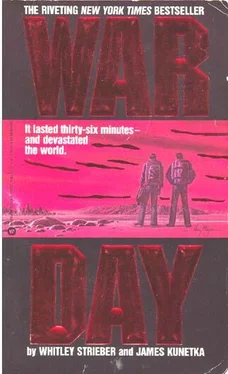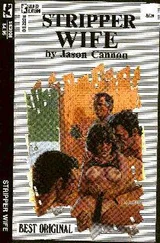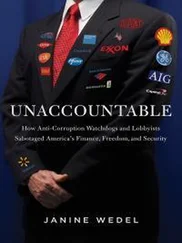“Not a dog?”
She shakes her head. “They don’t come up this high. Big, though. Maybe a zoo animal. Some of them around. A few. All the way down here, s’funny. I wouldn’t expect it.”
Jenny has her revolver out.
“You think it’s still here?”
At first she doesn’t answer. When she moves toward the back rooms, I follow. I make a mental note that we can go down the fire escape if we have to. Jenny takes a deep breath. “Doesn’t smell like animals,” she says softly. I notice that she cocks the pistol.
In places the floor has a disturbing springy quality to it. If I jumped, I don’t doubt that I’d end up in the apartment below.
We reach Andrew’s room. There is his Apple computer on his desk, his bed forever unmade, his paintings on the walls, most of them rotted beyond recognition. His dresser has fallen apart.
There is a dried cowboy boot in the middle of the floor. As this room faces west and north, winter blows in here, and his bookshelf is a bulging, sodden ruin.
The room echoes with so many past voices, him and his friends, a thousand bedtime stories.
It is in my office, where I wrote The Hunger and Catmagic, that I see my first clear sign of the last desperate days of this city.
There is a can of Sterno on the floor, and three empty tins from the kitchen, their contents and even their paper labels long since eaten.
I wonder who was here. Could it have been our neighbors? What might have happened to them? Elizabeth, the model, tall and gentle, her face at the edge of unforgettable beauty. Roberto, full of laughter, a native of Italy, wine importer, friend of evenings. Until this moment I have not remembered them, and I feel guilty for it.
“Come here,” Jenny says. She is looking into the bathroom opposite my office, where I used to soak in the tub to ease the lower-back pain of a sedentary life.
Bones, jumbled, gnawed, skulls pocked and pitted, teeth grinning, bits of clothing adhering to gnarls of ligament.
I cannot help myself. I scream.
Jenny neither scolds nor laughs nor sympathizes. When I stop, she begins talking again. “Stay-behinds. You see ’em all over the place.”
“How did they die?”
“Every way you can imagine.” She flashes her light into the bathroom. “That vent. Probably brought in short-half-life dust, so they mighta gotten radsick. Or maybe they were scared to leave and they starved. That happened too. Or violence. Suicide. Take a coroner to tell you, and that I’m not.”
It is then that I see, standing in the door of our bedroom, the most enormous cat I have ever encountered. Its eyes meet mine and its ears go back. It crouches and hisses. “Damn,” Jenny says.
And then she pumps bullets into it until the head disappears into a red cloud of bone and blood. The creature slams across the room and then slumps to a tawny, blood-pumping heap on the floor.
“What the hell is that?” It looked like a cross between a blond Persian and a Manx, but four times as big as either.
“Damned if I know. Big cat.”
“Giant cat.”
“I’m gettin’ out of this hole, and so are you. You want to get killed, you can stay behind.” On the way out I see, lying on the floor of the living room, the china bud vase my mother gave Anne for one of her birthdays. I snatch it up as if it were a gold dollar and put it in my pocket.
Jenny won’t go near the fire escape, so we return down the stairs. The dark behind us seems so dangerous that it is all I can do not to run.
It will be a long time before I can think about that apartment again.
INTERVIEW
Morgan Moore, Salvor
I entered the salvage business in 1989. I’ve been a salvor for four years now. Mostly we work the New York Reclamation District, Southern Division. But I’ve also got permits for the District of Columbia and an iron permit for freelance railroad work in the Northeast Corridor. I have twelve guys and about six pieces of equipment, including a heavy-duty wire puller that strips copper wire out of conduit, a couple of rivet poppers, a wrecking ball, and one hell of a good set of torches.
My lifedose has put me on the triage, which means I’m unbeatable, so I don’t give too much of a damn about counts. I work hard, and when I can, I have all the fun that money can buy. Life’s too short for anything else. I’ve got about eight-percent body coverage squamous, mostly face and neck. No pain. I’d like to wangle a trip to England. There’s a doctor there who might be able to get me a number, but he wants a thousand in gold. A thousand! So I take black-market radiums at a buck a pop. But I better not talk on that.
You want to know what we do? Simple. We work the salvage area for anything marketable. That’s what we do. Our P-and-L puts us high, but that’s mostly because of depreciation on the Demon, which is our main cutting tool. It gets a lot of work. Mostly we’re in for cutting out steel and copper from skyscrapers. We participated in the One Chase Manhattan Plaza demo for gold, though.
Now that was a hell of a demo. Salvors are still talking about it.
We were new, a small company. In those days we didn’t have the kind of equipment we’ve got now. I mean, I started up by just saying to myself. I want to make some of that goddamn salvage money. I was an assistant product manager for Triton Systems before the war. We marketed video games, can you believe it? That was a very big business. Multimillions. Even in new dollars we’d be grossing a hell of a lot. It was, like, I think thirty million in 1986.
Big.
So I was out on my ass after the war. Triton’s bank accounts had been erased by EMP. Then the stock market dissolved and all the Triton stock just ceased to exist. No different from everybody else. Except our inventory was destroyed. EMP burned every chip we owned, and ruined our fabrication equipment.
By ’89 I was stealing food. Trouble was, so was everybody else.
There was a point when I would have sold my sister for two minutes alone with a loaf of Wonder Bread. Here we were, living in a two-hundred-thousand-dollar house in Darien and there’s the five-year Connecticut moratorium on mortgages declared, so we got no mortgage to worry about. You know what it was like. People were starving all around us. I remember, I went into a supermarket with a shotgun. Big deal. Everybody else had a gun too. Bread is eight dollars a loaf and I have, like, a dollar. I would have given away my house for that Wonder Bread, plus sold my sister.
When that hot dust drifted down into the wheat and corn belts.
America learned what it was to goddamn not eat.
I figured we’re all going to die anyway, so I’ll just say the hell with rads and the hell with everything and go into salvage.
Now, of course, it’s a different story. We got a waiting list to enter the Salvor’s Association. We’ve been regulated by the Army.
But back when I started, people were scared of salvage work.
They still thought in terms of prewar life expectancies. People still thought they ought to feel young at forty.
Sally—that was my wife—she made my first rad suit. Sewed it herself out of an old swimming-pool cover. We used bonded lead epoxy in it that I made myself. I got the lead out of car batteries, just like everybody else. Stole ’em. I don’t mind admitting it. I hurt people to get the lead for that suit, and I’m sorry. But most of ’em didn’t last the winter anyway. I mean, we starved half to death and then the flu came, just when we were weakest. Darien probably lost half its people. Sally died in the spring of ’89. Just so weak, anything would have taken her. We had noodle soup that winter, from the Connecticut Allocation when it got started up in January. I remember, Christmas of ’88 we were living on soup made out of dandelion roots and salt and Fritos. We were just a little hungry.
Читать дальше












